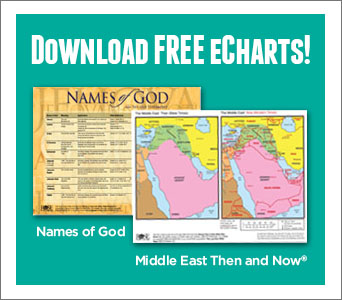
With Resurrection Sunday/Easter right around the corner, a lot of us are gearing up for one of the biggest church-attendance days of the year next to Christmas. You’ll be receiving guests in your chapel or sanctuary that only set foot in church maybe once or twice a year! It’s an opportune time to share the good news of the gospel.
But year after year, and Easter play after Easter play, how can we keep the message of the resurrection fresh in our own hearts and minds? An amazing way to do this is to reflect on and pray through the Names of God… That contagious joy and freedom is a soothing balm to the soul.
5 Names of God for Easter
1. Righteous One (Tsaddik)
The Lord is righteous in all his ways and faithful in all he does.” -Psalm 145:17
 To be righteous is to be free from sin—in short, to always be right. This is God’s nature. He is never wrong. He always does what is right. He is always perfect in His interaction with His creatures. He’s always free from shady motives and suspect thoughts. His track record is untainted by foolish decisions. Conversely, we are guilty of all those unrighteous things—even when we don’t feel especially bad about them.
To be righteous is to be free from sin—in short, to always be right. This is God’s nature. He is never wrong. He always does what is right. He is always perfect in His interaction with His creatures. He’s always free from shady motives and suspect thoughts. His track record is untainted by foolish decisions. Conversely, we are guilty of all those unrighteous things—even when we don’t feel especially bad about them.
The righteousness of God, then, becomes one of humanity’s greatest problems. How can a righteous God have anything to do with people who are unrighteous? If we’re not right (righteous) in our essential nature, we surely can’t be right with God.
So God—in His goodness, grace, and love—makes us righteous. He does this through Jesus. An eternal exchange takes place when by faith we trust in Jesus and what He did at the cross— taking our sin, guilt, and shame upon Himself and dying in our place. By paying for our crimes, Jesus satisfied divine justice. But that’s not all. He also shared His righteousness with us. With Jesus as our substitute and Savior, we can stand before God and actually be right with God (2 Corinthians 5:19–21).
You may not feel righteous, but if your hope is in Christ alone, you are right with God.
Facts always trump feelings; the reality is that the followers of Jesus Christ are the very righteousness of God.
2. God of My Salvation (El Yeshuati)
“Surely God is my salvation; I will trust and not be afraid. The Lord, the Lord himself, is my strength and my defense; he has
become my salvation.” -Isaiah 12:2
By calling God El Yeshuati, Isaiah reminds us of two great truths: (1) We are in desperate need of rescue; and (2) our God is the One who can provide that needed deliverance. Because His heart desires to give rest and victory, He is mighty to save and intent on liberating, redeeming, bringing out, and restoring.
By focusing on El Yeshuati, we model the hope expressed in Psalm 68:20: “Our God is a God who saves; from the Sovereign Lord comes escape from death.”
When we focus on God as the author and finisher of our salvation, it drives us to be dependent on Him.
3. Redeeming God (Jehovah-Go’el)
“I will make your oppressors eat their own flesh; they will be drunk on their own blood, as with wine. Then all mankind will know that I, the Lord, am your Savior, your Redeemer, the Mighty One of Jacob.” -Isaiah 49:26
The verb redeem in Hebrew means to purchase or buy back something (or someone). When an ancient Hebrew became enslaved, it was customary for the next of kin to play the part of a “redeemer” and pay the necessary price to purchase the relative’s freedom.
The Bible says our God does that for us. Redeemer is one of His names. He created us to glorify Him. As such, we belong to Him. But because of sin, we are slaves (Romans 6:20). And we would remain in that desperate state if it weren’t for Jesus. On the cross, Jesus bought us out of slavery and set us free. He redeemed us.
You have been redeemed and set free. Choose to walk in that freedom. And then share the good news of your redemption. Heed the words of Psalm 107:2: “Let the redeemed of the Lord tell their story.”
4. Prince of Peace (Sar-Shalom)
“And he will be called Wonderful Counselor, Mighty God, EverlastingFather,Prince of Peace.” -Isaiah 9:6
Isaiah introduced the idea of God as Sar-Shalom (Isaiah 9:6) revealing that God Himself is peace and also the giver of peace. Real life, rich life, abundant life—the life we want—is found only in Him. On the cross, Jesus made it possible for sinners to have peace with God. Overcoming death, Jesus now lives and reigns in the hearts of millions, affording us the capacity to experience the peace of God. He gave us peace in the ultimate sense.
All our temporal experiences of peace give us a glimpse of the ultimate and eternal peace we will have at last in heaven. Peace may be something we chase aft er, but true peace can only come as a gift from God.
5. The God Who Saves (El-Moshaah)
“Our God is a God who saves; from the Sovereign Lord comes escape from death.” -Psalm 68:20
Each god in antiquity was known for a certain strength or ability. Zeus was known as the king of the gods. Athena was considered the goddess of war. Apollo was regarded as the god of the sun. Poseidon was the god of the sea. Aphrodite was worshipped as the goddess of love and beauty. Ares was the god of war.
Israel’s God set Himself apart by identifying Himself as the “God who saves” (El-Moshaah). What could be more meaningful to
any human anywhere than escaping death?
Our God is the God who saves. Of course, He does much more than that. He is not limited to one “specialty” like Athena or Apollo. In addition to saving, He creates, redeems, delivers, protects, and so much more.
Who or what needs saving in your life today? Call upon El-Moshaah, the God who saves.
How to Pronounce The Names of God in Hebrew
Why Should I Study God’s Names?
 For a lot (if not ALL) of the same reasons you need to study the Bible! Learning God’s names is not just an academic experience. It’s not like memorizing flashcards or a recipe by heart. It’s a fluid and transformative experience. Learning God’s names changes you from the inside out. It’s a study we should continue throughout our lives, in all seasons.
For a lot (if not ALL) of the same reasons you need to study the Bible! Learning God’s names is not just an academic experience. It’s not like memorizing flashcards or a recipe by heart. It’s a fluid and transformative experience. Learning God’s names changes you from the inside out. It’s a study we should continue throughout our lives, in all seasons.
Become more acquainted with God’s character and nature through his names. It’s like spending time with a friend or a loved one. You start seeing his hand in your life circumstances, whether it’s his providence, mercy, justice, love, or friendship. It’s a key to understanding the great plan he has for your life. It’s essential to knowing who you are and what you were made for. Who better to ask than God Himself!
The above snippets are from the book 100 Names of God Daily Devotional. Commit to learning one name of God every day with 100 Names of God Daily Devotional by Christopher D. Hudson. ORDER IT NOW.

 Christopher D. Hudson has contributed to over fifty Bible projects, sixty study guides and over a hundred books. He has also served as managing editor for best-selling Bibles such as: The Love Languages Devotional Bible with Gary Chapman (Moody); Inspirational Bible with Max Lucado (Thomas Nelson); and the Case for Christ Study Bible with Lee Strobel (Zondervan). He is a graduate from Wheaton College (Wheaton, IL) and is an active teacher in his church for over twenty years. He is from Chicago, IL, where he resides with his wife and three children.
Christopher D. Hudson has contributed to over fifty Bible projects, sixty study guides and over a hundred books. He has also served as managing editor for best-selling Bibles such as: The Love Languages Devotional Bible with Gary Chapman (Moody); Inspirational Bible with Max Lucado (Thomas Nelson); and the Case for Christ Study Bible with Lee Strobel (Zondervan). He is a graduate from Wheaton College (Wheaton, IL) and is an active teacher in his church for over twenty years. He is from Chicago, IL, where he resides with his wife and three children.
FREE “10 Names of Jesus” eChart
 Sign up for Rose Publishing’s email list to download this eChart now!
Sign up for Rose Publishing’s email list to download this eChart now!
Jesus has many names in both the Old and New Testament and each name shows Him in a different light. For example, “Emmanuel/Immanuel” means “Jesus is God with us” and is referenced in Isaiah and Matthew; “Messiah” means “Jesus is Messiah” and is referenced in Daniel and John; and “Redeemer” means “Jesus is our redemption” and is referenced in Job. The Names of Jesus eChart from Rose Publishing contains 10 different Names of Jesus, the meaning and related titles for each name, as well as Bible references where the name can be found. The Names of Jesus eChart is a great study tool to help you better understand our Lord and Savior.


